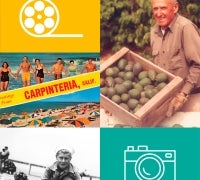
Carpinteria Valley Museum of History (956 Maple Ave., Carpinteria)
The UCSB Library’s Santa Barbara Community Archives Project is partnering with the Carpinteria Valley Museum of History to digitize and preserve the histories of Carpinteria Valley families. Participants’ family photographs and family films will be digitized for free by UCSB Library and preserved for future generations in the Library’s Local History Collections.
UCSB Library Curators will be scanning photographs during the event and also collecting eligible family films for free off-site digitization. Original materials and digital files will be returned to the families at no cost. UCSB Library will then provide long-term preservation for the digital copies.
To learn more about the event and the services we will provide to you, please check the FAQ below or stop by the Carpinteria Valley Museum of History’s Free Family Day on Saturday, November 9. Membership in the Museum is not required to participate in these free events.
Host Bios
Laura Jean Treat Liebhaber is a Curator at UCSB Library Special Research Collections where she oversees the Film & Television, Santa Barbara & Local History, and Oral History Collections. Laura was born and raised in California’s Central Valley to a family of local history enthusiasts and has called Santa Barbara home since joining UCSB Library in 2020. Along with her colleague Angel Diaz, Laura launched the Santa Barbara Community Archives Project, a UCSB Library initiative to document the rich and diverse communities that make up Santa Barbara by digitizing, preserving, and sharing family histories. For more than a decade, Laura has dedicated her professional work to preserving home movies. While at the University of North Texas, Laura ran two successful home movie digitization projects and local film events under the name Spotlight: North Texas with funding from the National Endowment for the Humanities. She also participated in the Texas Archive of the Moving Image’s award winning Texas Film Round Up Program. Laura holds an M.S.I.S. from the University of Texas at Austin’s School of Information. She is Member of the Board of the Association of Moving Image Archivists and Co-Chair of the AMIA Local Television Task Force.
Angel Diaz is a Curator at UCSB Library Special Research Collections where she oversees the California Ethnic & Multicultural Archives (CEMA) and the History of California and American West Collections. Angel was born and raised in San Diego. As a Mexican-American daughter of immigrants who worked in agriculture, auto, and landscaping trades, she is proud to document the rich cultural diversity that makes up this state. Angel holds an M.L.IS. from the University of California, Los Angeles and a MA in Teaching from the University of San Francisco.
Frequently Asked Questions
What can I expect at this event?
Space is not reservable and is available on a first-come-first serve basis during the program hours. Depending on the quantity of items you bring and their physical condition, you may expect to spend approximately 30-minutes with UCSB Library Curators to review the items, discuss their contents, and sign forms.How much does it cost to participate?
Participation is free for qualified collection materials.What kinds of content are you interested in for your program?
Though eligible items may come from anywhere in the Central Coast, we are particularly interested in films that feature families in the Carpinteria Valley. We’re excited to see your birthday parties and other family celebrations, but we’d also love to see local parades and other significant events to the Carpinteria Valley community, local businesses and organizations, local landmarks and places of interest, and sports and leisure activities such as surfing and skateboarding, and ranching and rodeos.What types of photographs are eligible for the free digitization program?
What types of home movies are eligible for the free digitization program?
What if my films were already transferred to videotape?
Even if your films were transferred to videotape years ago, if they meet the above eligibility criteria, we can digitize these materials for you using more advanced film scanning technology. We highly encourage using the original films rather than the videotape copies for both preservation and access. The quality of your digitized materials will be much improved!What if my films were already digitized?
Even if your family’s films have already been digitized, we’d still welcome the opportunity to scan them at a preservation-level quality or add your digital copies to our collection if the original films no longer exist.What will you do with my films after I drop them off?
What will you do with my photographs?
Photographs will be scanned onsite at the event, and will be returned to you at the event.What services are provided in this program?
What will the UCSB Library do with the digital files you create?
How can I get more information?
Please contact the Project Curator Laura Jean Treat Liebhaber at ljtreat@ucsb.edu.


